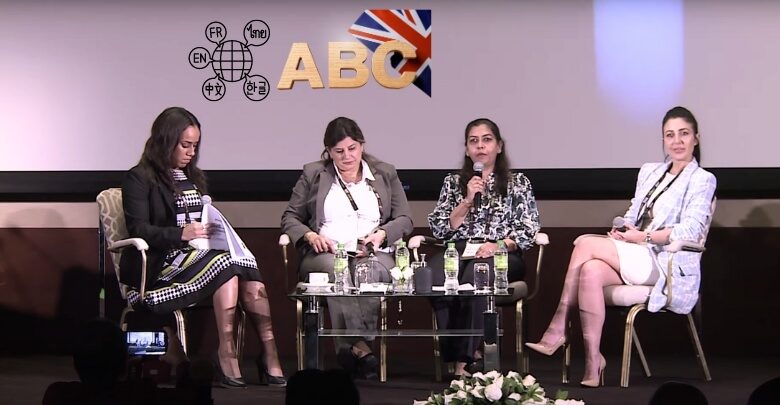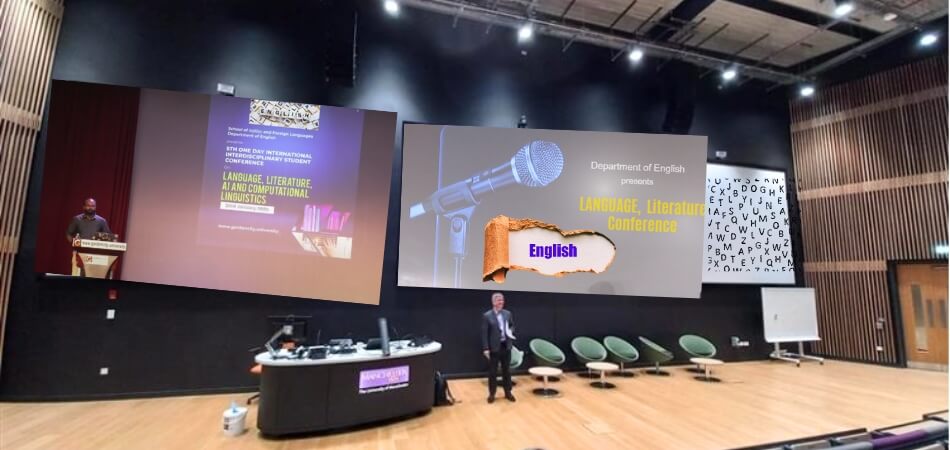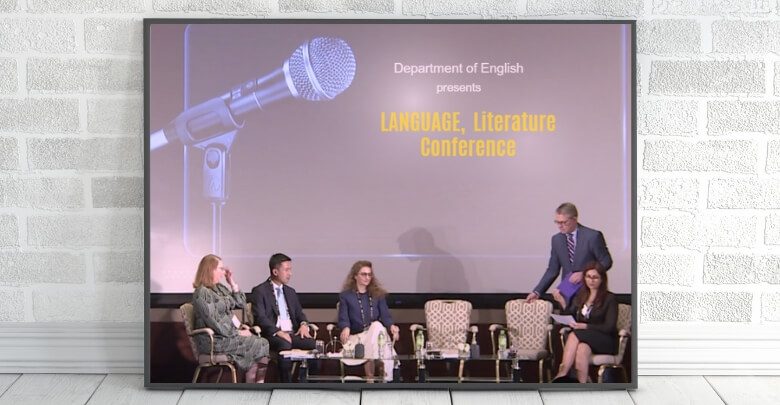A Language Literature Conference is a gathering of scholars, students, and enthusiasts passionate about language and literature. These events provide a platform for exchanging ideas, showcasing research, and networking with peers. So, what are the benefits of attending a language literature conference?
Language literature conferences offer a wealth of knowledge. You’ll hear from top scholars, exchange ideas with peers, and build your network. Improve your critical thinking and communication skills while igniting your passion for language and literature.
Curious to learn more? Follow the rest of the article to explore the amazing benefits that await you at a language literature conference!
Language Literature Conference: What Defines It?
Conferences on language literature provide a platform for scholars and enthusiasts to discuss linguistic and literary topics. Research collaboration and innovation are encouraged by these gatherings. Participants from diverse backgrounds will come together to explore the multifaceted dimensions of language and literature, making the upcoming language and literature conference an exciting opportunity for all involved.

The topics covered at such conferences range from classical literature to contemporary linguistic theories. Workshops and panel discussions explore literary texts and linguistic phenomena. Scholars share insights, methodologies, and findings, enriching scholarly discourse at an overseas educational conference.
A language literature conference often features keynote speeches by eminent scholars who offer valuable perspectives. Theoretical frameworks, methodological approaches, and emerging trends are discussed. These conferences are crucial to advancing scholarship and raising a vibrant community of language and literature enthusiasts.
What Are the Benefits of Attending a Language Literature Conference?
Attending a language literature conference can be a transformative experience. Immerse yourself in a vibrant community of scholars. An overseas conference organizer hosted a language literature conference that attracted a diverse group of participants, showcasing what are the benefits of attending a language literature conference. Here are some key benefits you can gain from participating in these events.

Networking Opportunities
One of the most significant advantages of attending a conference is the chance to connect with peers, established scholars, and industry professionals.
- Build Professional Relationships: Conferences create an environment where you can meet fellow attendees who share your interests. This can lead to fruitful collaborations, research partnerships, and lifelong friendships.
- Engage with Experts: Meeting renowned scholars can provide valuable insights and mentorship opportunities. You can discuss your work, seek advice, and even explore future research collaborations.
Access to the Latest Research and Trends
Language literature conferences often showcase the most current research in the field.
- Stay Informed: By attending presentations and panels, you will learn about emerging trends, methodologies, and groundbreaking studies that could inform your own research.
- Diverse Perspectives: Conferences attract scholars from various backgrounds, enriching your understanding of different approaches to language and literature.
Development of Presentation Skills
Presenting your research at a conference is an invaluable experience.
- Gain Feedback: Sharing your work with an audience allows you to receive constructive criticism, which can enhance the quality of your research.
- Sharpen Public Speaking Skills: Regularly presenting at conferences helps you become a more confident and effective communicator, a skill essential for an academic career. Attending a language literature conference can significantly improve these skills.
Workshops and Skill Development
Many conferences offer workshops aimed at enhancing specific skills.
- Hands-On Learning: Participating in workshops provides practical experience, whether it’s in research techniques, teaching methodologies, or writing skills.
- Customized Learning: You can choose workshops that align with your career goals, allowing for a personalized learning experience.
Publication Opportunities
Presenting your work at a conference often opens doors for publication.
- Visibility: Many conferences publish their proceedings, providing an opportunity to have your research recognized and cited.
- Connect with Publishers: Conferences also attract editors and publishers, giving you a chance to discuss potential publication opportunities.
Interdisciplinary Collaboration
Language literature conferences foster interdisciplinary dialogue.
- Engage Across Disciplines: By interacting with scholars from different fields, you can explore the intersections of language, literature, culture, and more.
- Broaden Your Perspective: Interdisciplinary discussions can lead to innovative ideas and approaches in your own work.
Inspiration and Motivation
The energy and enthusiasm at conferences can be contagious.
- Exposure to New Ideas: Engaging with various presentations and discussions can ignite your creativity and inspire new research questions.
- Renewed Passion: Being surrounded by like-minded individuals who are passionate about language and literature can rekindle your enthusiasm for your field.
Understanding Cultural Contexts
Language literature conferences often highlight global perspectives.
- Explore Diverse Cultures: By attending, you gain insights into how language and literature intersect with various cultural contexts.
- Promote Cultural Sensitivity: Engaging with international scholars helps broaden your understanding of different cultural backgrounds, enhancing your research’s depth.
Professional Development
Participating in conferences is an investment in your career.
- Resume Building: Attending and presenting at conferences is a strong addition to your CV, showcasing your active involvement in the academic community.
- Access to Resources: Conferences often provide attendees with resources such as research tools, publications, and insights into job opportunities.
In summary, attending a language literature conference can significantly enhance your academic and professional journey. From networking and accessing cutting-edge research to honing your presentation skills and gaining a deeper understanding of cultural contexts, the benefits are extensive.
Besides, attending a language literature conference provides not just a platform for personal growth but also an avenue to contribute meaningfully to the broader academic community. So, if you’re considering attending one, seize the opportunity—it may very well be a transformative experience in your academic career.
How to Prepare for a Language Literature Conference?
Attending a language and literature conference is both exciting and daunting. Proper preparation ensures you get the most out of the experience, engage effectively with peers, and enhance your professional growth. Here’s a step-by-step guide to help you prepare.
Step 1: Research the Conference Theme and Agenda
Learn about the main topics and objectives of the conference. Get to know the sessions, keynote speakers, and workshops at upcoming language literature conferences. Understanding language literature conferences can help you tailor your participation and focus on relevant areas of interest.
Step 2: Organize Your Travel and Accommodation
Ensure your travel arrangements are sorted well in advance. Choose accommodation close to the conference venue for convenience. Having a comfortable stay and a clear travel plan minimizes stress and allows you to focus on the event.
Step 3: Prepare Your Presentation or Paper
If you are presenting, refine your paper or presentation to meet the conference guidelines. Practice delivering your presentation to ensure it fits within the allotted time and effectively communicates your key points.
Step 4: Pack Essential Materials
Gather all necessary materials, including business cards, notebooks, pens, and electronic devices with chargers. Bring copies of your presentation or paper, either printed or on a USB drive, to distribute or reference during the event.
Step 5: Plan Your Conference Schedule
Create a detailed schedule of sessions and events you wish to attend. Prioritize must-see presentations and workshops. Allocate time for networking opportunities, ensuring you make meaningful connections with other attendees.
Step 6: Network and Engage with Peers
Take advantage of networking opportunities to connect with fellow attendees. Engage in discussions, share your research, and seek feedback. Building relationships with peers and experts in your field can lead to future collaborations and insights.
Step 7: Prepare Questions and Discussion Points
Think of insightful questions or discussion points related to the conference topics. This preparation helps you actively participate in sessions and engage with speakers, demonstrating your interest and deepening your understanding of the subjects.
Step 8: Utilize Social Media
Use social media platforms to connect with other attendees and share your experiences. Follow conference hashtags and join related discussions. Engaging online can increase your visibility and allow you to connect with a broader audience.
Step 9: Reflect and Follow Up
After the conference, take time to reflect on what you learned and how it can be applied to your work. Follow up with new contacts, send thank-you emails, or connect on professional networks to maintain relationships.
Tips for Making the Most of Language Literature Conferences
The benefits of attending language literature conferences are numerous. To fully benefit, it’s important to approach these events strategically. Here are some tips to help you make the most of your experience.
- Plan Ahead: Research the conference agenda in advance to prioritize sessions. This ensures you don’t miss out on important presentations or networking opportunities.
- Engage Actively: Participate in discussions and ask questions during sessions. Active engagement helps you gain deeper insights and shows your interest in the topics.
- Network Wisely: Introduce yourself to speakers and fellow attendees. Building connections can lead to future collaborations and professional growth.
- Take Notes: Document key points and ideas from presentations. These notes will be valuable for future reference and help reinforce your learning.
- Share Your Insights: Use social media to share your conference experiences. Posting about sessions and insights can increase your professional visibility and start interesting conversations.
- Follow-up: After the conference, reach out to new contacts. Sending a follow-up email helps maintain connections and can open doors for future opportunities.
Frequently Asked Questions
Taking part in a language literature conference can have a significant impact on your professional and personal development. Here are ten frequently asked questions about the advantages of participating in these events.
How Can These Conferences Inspire My Work?
Keynote speeches and engaging discussions often spark new ideas. Conferences feature leading voices who offer valuable insights into the field. These inspirations can motivate you to explore new research areas and improve your work.
What Skills Can I Improve by Attending These Conferences?
Participating in workshops and sessions improves your research and presentation skills. These practical experiences teach new methodologies and techniques. Improving these skills contributes to your academic and professional development.
How Does Sharing My Work Benefit Me?
Presenting your research at a conference allows you to share your findings with a broader audience. It provides a platform for receiving constructive feedback. This feedback helps refine your work and improve its quality.
Why Is Staying Updated with Trends Important?
Language literature conferences keep you informed about the latest trends and developments in the field. Staying updated is crucial in a constantly evolving discipline. It ensures your work remains relevant and impactful.
How Do These Conferences Contribute to Personal Development?
Attending conferences helps build confidence and hone communication skills. Engaging with diverse ideas and people expands your horizons. It’s a holistic experience that improves various aspects of your life.
Bottom Line
Language literature conferences offer a wealth of opportunities for professional and personal growth. From expanding your knowledge and improving your research skills to networking and gaining inspiration, these events are invaluable. Proper preparation and active participation can significantly improve your experience.
So, what are the benefits of attending a language literature conference? Attendees gain exposure to new theories, methodologies, and trends, which can inspire and improve their work. Academic communities can benefit from collaboration and networking. Research sharing can also refine your ideas and boost your professional profile.
Language literature conferences are transformative. Develop valuable connections, stay up to date with the latest trends, and immerse yourself in a vibrant community. You can improve your knowledge, skills, and professional network through these events, ultimately contributing to your growth and success.






